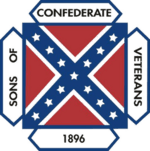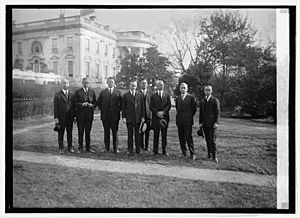Sons of Confederate Veterans facts for kids

|
|
| Abbreviation | SCV |
|---|---|
| Established | July 1, 1896 |
| Founder | R. E. Lee Camp, No. 1, Confederate Veterans |
| Founded at | Richmond, Virginia |
| Type | 501(c)(3) |
| Headquarters | Elm Springs, Columbia, Tennessee |
|
Area served
|
Worldwide |
|
Membership (2019)
|
c. 30,000 |
|
Commander-in-Chief
|
Larry McCluney |
| Jason Boshers | |
|
Adjutant-in-Chief
|
Dan McCaskill |
| General Executive Council | |
|
Key people
|
Executive Director Adam Southern |
| Publication | Confederate Veteran |
|
Formerly called
|
United Sons of Confederate Veterans |
The Sons of Confederate Veterans (SCV) is an American neo-Confederate nonprofit organization of male descendants of Confederate soldiers engaging in the commemoration of these ancestors, the funding and dedication of monuments to them, and the promotion of the pseudohistorical Lost Cause ideology and corresponding white supremacy. The SCV was founded on July 1, 1896, in Richmond, Virginia by R. E. Lee Camp, No. 1 of the Confederate Veterans. Its headquarters is situated at the Elm Springs in Columbia, Tennessee.
In recent decades, governors, legislators, courts, corporations, and anti-racism activists have placed new emphasis on the increasingly controversial public display of Confederate symbols—especially after the 2014 Ferguson unrest, the 2015 Charleston church shooting, and the 2020 murder of George Floyd. SCV has responded with its coordinated display of larger and more prominent public displays of the battle flag, some in directly defiant counter-protest.
Contents
Purpose
Like the United Daughters of the Confederacy, the SCV have been promoting the ideology of the Lost Cause of the Confederacy, a deliberate distortion of the history of the Civil War and Reconstruction inextricably linked to White supremacy. That ideology or mythology told the story of "faithful slaves and a virtuous South oppressed by Northern tyrants". One of its central tenets is that the Civil War was fought over states' rights and not over slavery. As of January 2022, the official website of the SCV states, "The preservation of liberty and freedom was the motivating factor in the South’s decision to fight the Second American Revolution."
The proclaimed purpose of the Sons of Confederate Veterans is "to encourage the preservation of history, perpetuate the hallowed memories of brave men, to assist in the observance of Confederate Memorial Day, to aid and support all members, and to perpetuate the record of the services of every Southern soldier".
Eligibility
Male descendants of those who served in the Confederate armed forces, or one of the constituent states, to the end of the war, died in prison or while in actual service, were killed in battle, or were honorably retired or discharged, are eligible for membership. Membership can be obtained through either lineal or collateral family lines. Kinship to a veteran must be documented genealogically. The minimum age for full membership is 12 years, but no minimum exists for cadet membership.
History
Early Years

Immediately after the defeat of the Confederacy, a Confederate memorial movement emerged. In the 1890s, this movement came to be controlled by the United Daughters of the Confederacy, the United Confederate Veterans (UCV, founded in 1889), and other, less important, organizations.
Forty delegates from 24 camps and societies from the various Southern states were called by the R. E. Lee Camp, No. 1, UCV, of Richmond, Virginia, to meet on June 30 and July 1, 1896, at the City Auditorium (present-day Virginia Commonwealth University Cary Street Gym), for the purpose of forming a "national organization, adopting a constitution similar in every respect to that governing the United Confederate Veterans, and permanently organized under the name United Sons of Confederate Veterans" (USCV).
The preamble to the USCV constitution reads in part: "To encourage the preservation of history, perpetuate the hallowed memories of brave men, to assist in the observance of Memorial Day, and to perpetuate the record of the services of every Southern soldier". Its aims, objects, and purposes are "not to create or foster, in any manner, any feeling against the North, but to hand down to posterity the story of the glory of the men who wore the gray". On July 1, the delegates elected J. E. B. Stuart, of Newport News, Virginia, son of the Confederate cavalry general, J. E. B. Stuart, Commander-in-Chief of the United Sons of Confederate Veterans.
Laura Martin Rose, a member of the United Daughters of the Confederacy and propagandist for the Ku Klux Klan, received an endorsement by resolution ("without a dissenting voice") of her 1914 book The Ku Klux Klan or Invisible Empire from the Sons of Confederate Veterans during the May 1914 SCV Reunion in Jacksonville, Florida, along with a SCV commitment to "have it placed into the schools throughout the South."
In 1919, the SCV joined forces with the bigger and more active United Daughters of the Confederacy and the United Confederate Veterans in the so called Rutherford Committee aiming at controlling the history textbooks used in Southern schools. The committee was named after Mildred Lewis Rutherford, the prominent historian of the United Daughters of the Confederacy.
Constitutional crisis
In the 1990s, disagreements over the purpose of the organization emerged within the Sons of Confederate Veterans. At issue was an alleged shift in the Sons of Confederate Veterans's mission from "maintaining gravestones, erecting monuments and studying Civil War history" to more issue-centric concerns. The Sons of Confederate Veterans's new concerns included "fight[ing] for the right to display Confederate symbols everywhere from schools to statehouses". The more "activist" members of the Sons of Confederate Veterans gained electoral support and were increasingly elected to its leadership positions. Members of the more traditionalist camp alleged that the League of the South had influenced their organization's new direction. One ally of the activist wing claimed that thousands of Sons of Confederate Veterans members are also League of the South members. News reports state that the activists advocate "picketing, aggressive lobbying, issue campaigning, and lawsuits" in favor of what they term "heritage defense" to prevent "heritage violations". The Sons of Confederate Veterans defines those as "any attack upon our Confederate heritage, or the flags, monuments, and symbols which represent it".
In 2002, dissidents within SCV formed a new organization, Save the Sons of Confederate Veterans, composed of members and former members of SCV. According to Save the Sons of Confederate Veterans co-founder Walter Charles Hilderman, "about a hundred or so individuals and groups identified themselves on the Save the Sons of Confederate Veterans web site as supporting Save the SCV" not long after the group was founded, though the current membership numbers for the Save the Sons of Confederate Veterans are not available. Boyd Cathey reported in the Southern Mercury that most of the dissension had ended by 2003, and the majority of the members of SCV agreed with the heritage preservation activities espoused by the new SCV leadership. One of the main figures in that new SCV leadership, South Carolina politician and investment advisor Ron Wilson, served as Commander-in-Chief from 2002 to 2004. In 2012, he was sentenced to prison for running a Ponzi scheme as part of his investment business; ironically, among those he defrauded were members of the SCV.
In early 2005, the SCV General Executive Council sued to expel Commander-in-Chief Dennis Sweeney from office. The court initially granted the council temporary control of the organization, but its final decision returned power to Sweeney. Thirteen of the 25 council members were expelled from the council shortly after Sweeney regained control. Nine of the council members expelled were former commanders-in-chief, a status that heretofore had come with a life membership on the council. In February, Cathey wrote in the Southern Mercury that most of the members of SCV had united against the War on Southern Culture. By the SCV's summer 2005 convention, activists firmly controlled the council. They severed much of the long-standing relationship between SCV and the more traditionalist Military Order of the Stars and Bars (MOSB). The MOSB, founded in 1938, had been closely involved with the SCV, sharing its headquarters since 1992 and co-publishing Southern Mercury. The MOSB's Commander General, Daniel Jones, citing "the continuing political turmoil within the SCV," moved the MOSB out of the shared quarters, ended the joint magazine publishing enterprise, and separated the two organizations' finances. In 2006, for the first time, the two organizations held separate conventions.
Relationship with SUVCW
SCV has a longstanding and mildly friendly relationship with the Sons of Union Veterans of the Civil War (SUVCW). The Commander-in-Chief of the SUVCW has attended the SCV annual reunions on multiple occasions, including in 1995, 1996, 1997, 2005, and 2017. The SUVCW cooperates with the SCV in preserving American Civil War graves, monuments, and markers.
Buildings and sites
The General Headquarters of SCV operates the National Confederate Museum at the Elm Springs in Columbia, Tennessee. Supporters claim the museum "will be out of the reach of the long arm of political correctness". Detractors have stated that "casting the Confederacy as a honorable force standing strong against Northern aggressors is a willful misreading of the historical truth that the institution of slavery was at the core of the Civil War".
The SCV also own and maintain Nathan Bedford Forrest Boyhood Home in Chapel Hill.
External links
See also
 In Spanish: Sons of Confederate Veterans para niños
In Spanish: Sons of Confederate Veterans para niños

